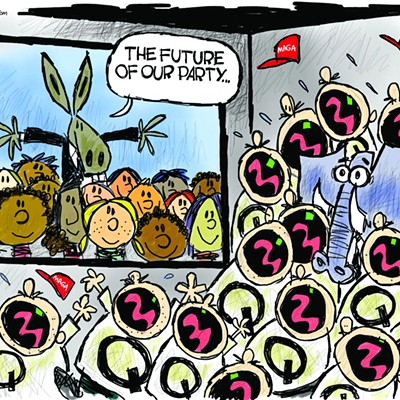Jeff Latas
If Jim Kolbe hadn't announced his retirement last Thanksgiving, Jeff Latas' campaign would have had an entirely different narrative. Democrats would have rallied behind the Gulf War vet as the tough-on-defense Washington outsider who would finally dispatch the 11-term incumbent.But the stakes got a lot bigger when Kolbe quit, drawing both Gabrielle Giffords and Patty Weiss into the race. While Latas has drawn a passionate group of supporters, he's been largely overshadowed by the better-known women in the race. The Wick Communications/Tucson Weekly poll, taken as early voting began, showed just 5.7 percent of Democrats supporting Latas.
But he remains confident he'll make a late surge, boosted by a DVD outlining his platform and bio mailed to high-propensity Democrats as early voting started.
On the disc, which includes endorsements from former Georgia Sen. Max Cleland and former Tucson Councilwoman Molly McKasson, Latas lays it out, starting with the Iraq war: It was a mistake to invade; the Bush administration has screwed up post-war planning; troops should be withdrawn in stages. Given that the Weekly poll showed the Iraq war is the top issue on the minds of 40 percent of the Democrats in District 8, it's no surprise that his stump speech draws applause at forums.
Latas, 48, has plenty else to say on the disc--and on his Web site, www.jefflatas.com, where he has laid out his positions on health care (government should provide universal insurance coverage), global warming (yes on the Kyoto Treaty; cut greenhouse gas emissions; develop alternative energy sources) and even the arts (supports funding, opposes government censorship).
He warns that the Bush administration tax cuts overwhelmingly favored the wealthiest Americans and should be repealed. He wants to better secure the border, but favors allowing most illegal immigrants now in the country to stay if they register with the government. He's pro-choice.
Latas rails against government corruption and says the majority of Americans are losing ground.
"This is the first time our country has given less opportunity for its people in its history," Latas says. "My children have less opportunity than I had. I think that's true across the board except the most wealthy class. We need to go back and instill some of the ideas of 30 years ago."
In short, Latas is a lefty--but his military background helps inoculate him against the suggestion that he's a squishy lib. Latas flew bombing missions over Baghdad during Operation Desert Storm and worked the Iraqi no-fly zones later in the 1990s.
Latas says he always wanted to fly: "I didn't just get to live a dream. I got to live the all-American boyhood fantasy." But, he adds: "I had to think about it, because I do have some peacenik roots."
Now a pilot for Jet Blue, Latas is a deft campaigner on the stump, where his slight drawl exudes confidence. He frequently targets the Bush administration as incompetent, calling himself "the candidate Karl Rove doesn't want you to know about." Once he gets to Washington, he's vowed to poke his finger right into Rove's chest and let him know he's wrong.
After he retired from the military, he started poking around in Arizona politics and even considered a legislative run against Republican state Sen. Toni Hellon in 2004. The more he talked to people, the more he found himself drawn to the federal arena.
"I realized that I had a lot more to offer than a lot of people who are activists in the Democratic Party," Latas says. "There are very few in District 8 who had the experience I have."
Latas, who announced his campaign about a month before Kolbe announced he wouldn't seek re-election, has struggled to raise money. (One reason the campaign mailed out the DVD was because Latas couldn't afford that many TV commercials.) At the end of June, he had raised less than $88,000--which doesn't give much in the way of resources to overcome the name ID of Giffords and Weiss.
Latas traces his liberal roots to growing up in a Democratic household in Kansas.
"I believe in the enhancement of society, and to do that, sometimes you have to be progressive in your thinking," Latas says. "I believe we're in this together, and we have to make society better as a group rather than individuals. When I look at the Republican ideology, I see it as more of a self-centered ideology--'I made the money, so therefore, it's my money, so why should I give it to the government?'"
Alex Rodriguez
Alex Rodriguez feels like he can't get any respect in his congressional campaign.Rodriguez, who won his rookie campaign for a Tucson Unified School District board seat two years ago, insists he's a contender in the congressional race.
"Everywhere we go, we've gotten very strong, positive response," says Rodriguez, who says his "background is perfect for the job."
The youngest of 10 kids, Rodriguez, 35, grew up in a low-income household in Nogales, Ariz. He says he knows what it's like to live paycheck to paycheck and not have health insurance.
A Raytheon employee, Rodriguez served in Bosnia and worked at the Pentagon during his years as an Army reservist.
"I'm running because I have a purpose; I have a reason to run," Rodriguez says. "I have firsthand experience on the border-security issue. I don't talk about public schools--I help improve public schools."
Rodriguez wants troops out of Iraq, but he doesn't set a strict timetable, saying they should be pulled out "with dignity and security--dignity to those troops who paid the ultimate sacrifice for the mission who went in under faulty premises to begin with, and for the security side, to assure that the problem doesn't get much worse than it already is."
Rodriguez's campaign has yet to catch fire. At the end of the last quarter, he'd raised just more than $28,000. Endorsements have been few and far between. (He complains that many of the organizations that have endorsed Giffords never even bothered to interview him.) And the Weekly poll, taken in mid-August, had less than 2 percent of voters surveyed supporting him.
Rodriguez says there are signs that his campaign is turning around. For example, he came in second place in a straw poll of Young Democrats earlier this month, capturing 18 votes compared to Gabrielle Giffords' 69 votes.
So how does he win the race? Rodriguez starts out with the questionable assumption that voters who supported him in the school board race will vote for him in the congressional contest. He says he can capture six other constituent groups.
"I have a base of votes I am starting out with," Rodriguez says. "I am banking on the vote getting so severely diluted by Weiss and Giffords and Latas and Shacter and Johnson--that they dilute each other's strengths, giving me an ability to go right through the center with voting blocs we have identified."
Bill Johnson
Bill Johnson is the only candidate who admits he has no chance of winning on Sept. 12."I don't think that's the object of the exercise at this point," says Johnson, 51, an attorney who specializes in corporate and international law.
Johnson, whose family roots in Cochise County go back several generations, wants his campaign to give him a soapbox to discuss his issues. Chief among them: illegal immigration. A member of the Minuteman Civil Defense Corps, Johnson takes a harder line on illegal immigration than any of his Democratic opponents--and some of the Republicans. He wants the border sealed; he wants all illegal immigrants now in the country kicked out "forthwith," and he opposes a guest-worker program.
"We need to close the border," Johnson says. "We need to make it a felony to be in this country illegally. We need to fine or otherwise sanction employers. I believe we must immediately engage in the deportation of illegals, all 20 million of them. I don't think our country has a future if we don't take control of this issue."
Johnson also wants to drastically cut federal spending, reduce the size and scope of the federal government, cut taxes and withdraw from Iraq in the next few months. While he doesn't support allowing private investment of Social Security dollars, he says he'd increase the age at which people would be able to collect it.
"Work is good," Johnson says. "People think the leisurely years are a time when you sit back and don't do any work. That's not good for people, and it's not good for society. The leisurely years are going to be less leisurely under my approach. And if people don't like to work, too bad. ... If they're old enough to work, park their RVs and go back and get a job."
Johnson says he changed his registration from independent to Democrat about a year ago.
"My parents were ardent Democrats," Johnson says. "But the Democratic Party took a hard left, and the Republican Party doesn't stand for the principles that I want."
He hopes his campaign will help steer the Democratic Party in a new direction.
"I think what the Republicans have done in the last six years is such a disservice to the country that there's going to be a change, and we're going to embrace traditional Democratic principles," Johnson says. "I'm really for the working man, and I like the populist principles, and I don't like the moneyed interests in the Republican Party. There's so much in the Democratic Party that I can embrace."
Johnson denies rumors that he's planning to start a "Democrats for Randy Graf" movement after the primary, even though his campaign manager, Russ Dove, has been a Graf ally.
"I have heard Randy Graf speak," Johnson says. "I don't know him. He doesn't know me. I have no desire to promote him. He is a traditional Republican, and I can't stand that. But I'm pleased that he's involved with the Minuteman project."
Francine Shacter
Francine Shacter has a secret weapon in her campaign: pens.Shacter hands out the pens, emblazoned with her name, to nearly everyone she meets on the campaign trail, with the hope that the personal touch will help her name stick in their minds.
If the Weekly's poll is right, Shacter has to hand out a lot more pens; only .3 percent of voters surveyed said they were supporting her.
Shacter doesn't have much money for her campaign. As of June 30, she'd raised less than $3,200.
But what she lacks in money, Shacter makes up with gumption. She hasn't tailored her message to court voters. She's an old-fashioned liberal who says her best skill is her capacity to bring people together.
Shacter, 78, had a long career in the federal government before retiring to Arizona two years ago. She worked on Capitol Hill, for the U.S. Census Bureau and for the Consumer Product Safety Commission.
Shacter wants to rescind the Bush tax cuts and increase taxes on the wealthiest Americans while giving more breaks to the average earner. She's pro-choice, favors federal funding for stem-cell research and wants the government to provide more health-care insurance.
Shacter decided against spending time raising money in favor of spending several hours a day studying up on the issues. "I don't see myself getting wrapped around an axle about money when I should be getting wrapped around an axle over issues. And there's two possibilities: Either it will work, or it won't work."















